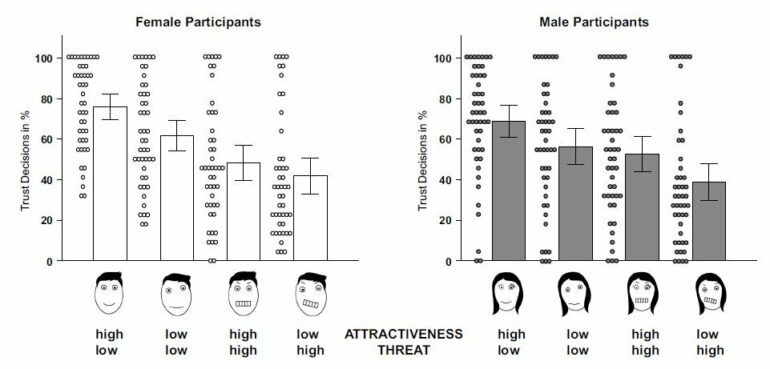Many studies in psychology have shown that people judge how trustworthy a person is on the basis of their first impression of the other person’s facial features. Whether there actually are differences between men and women in this respect has now been investigated by the researchers Dr. Johanna Brustkern, Prof. Dr. Markus Heinrichs and Dr. Bastian Schiller from the Department of Psychology at the University of Freiburg together with Dr. Mirella Walker from the University of Basel in Switzerland. In their experiment, men and women were asked to decide, based on portrait photos of a person of the opposite sex, whether they would entrust that person with money with the risk that the person would keep the money for him- or herself. The bottom line: The faces in the photos varied in their attractiveness and threat. In the study, women trusted attractive-, threatening-looking men significantly less than men trusted attractive-, threatening-looking women. The scientists recently published their research results in the journal Scientific Reports.
Women and men trusted attractive people more often
For the experiment, the research team invited 47 heterosexual men and 46 heterosexual women. Both sexes entrusted their money to attractive-looking people more often than to threatening-looking ones. However, there was also a sex difference: while participants’ trust was equally influenced by attractiveness and threat, female participants’ trust changed more through threat than attractiveness. “This suggests that a woman’s very attractive face can compensate for her threatening appearance, at least in the eyes of heterosexual men. Women, on the other hand, are less likely to be blinded by an attractive man. These differences could be evolutionary, as women invest a lot of time and resources during pregnancy and breastfeeding and therefore choose a potential partner very carefully,” explains Johanna Brustkern.
Bastian Schiller adds, “Our study shows that not all research findings in social and behavioral sciences apply equally to men and women. Therefore, it is important to counteract the prevailing tendency to study male subjects only and thus be able to consider sex as an important influencing variable on our behavior.” Markus Heinrichs emphasizes, “Biologically ‘old’ mechanisms definitely need to be given more attention in human research studies to better understand our social behavior today.”
More information:
Johanna Brustkern et al, Facial threat affects trust more strongly than facial attractiveness in women than it does in men, Scientific Reports (2021). DOI: 10.1038/s41598-021-01775-5
Provided by
University of Freiburg
Citation:
Women are less blinded by attractiveness than men (2021, November 23)



